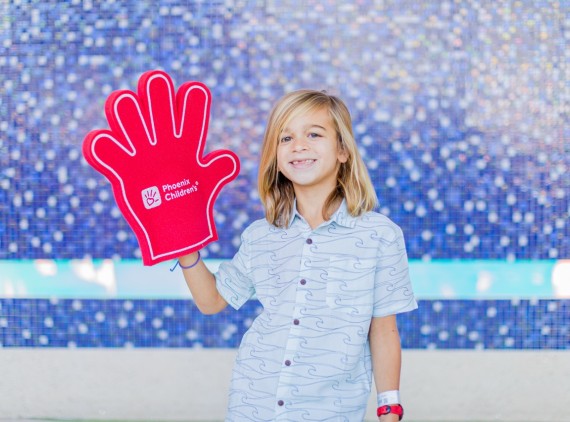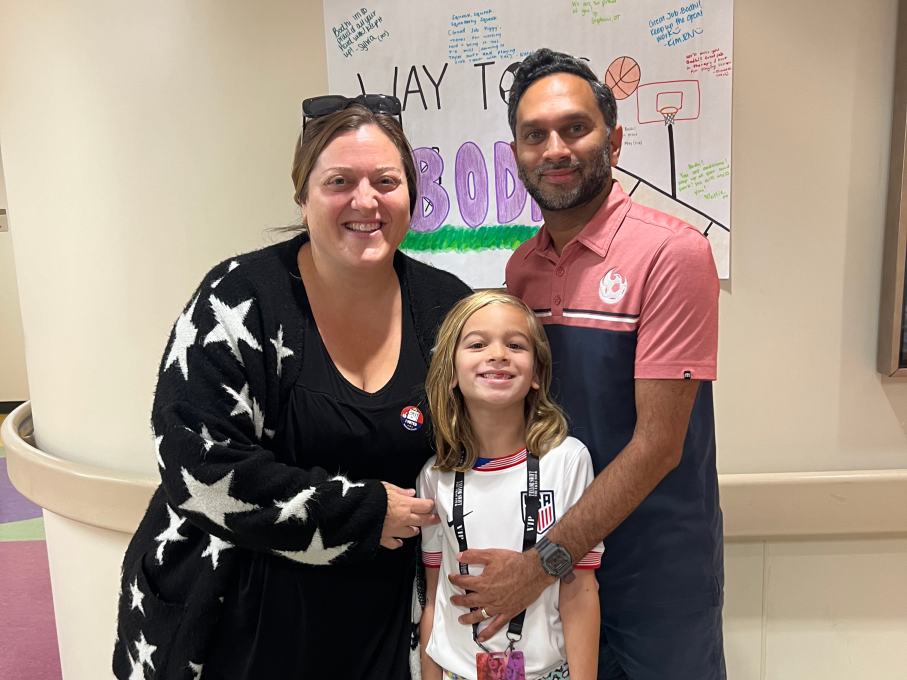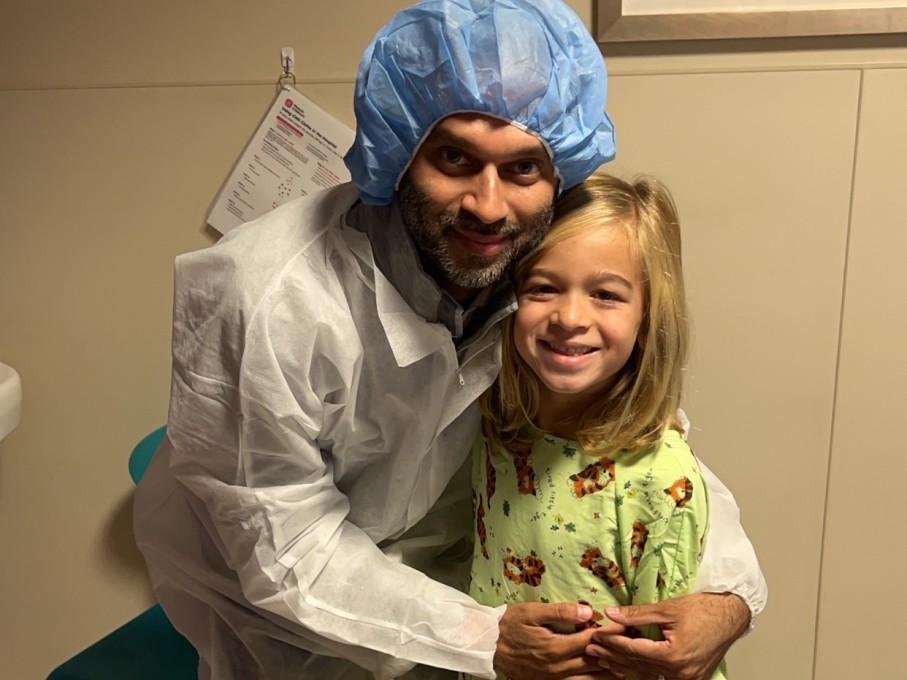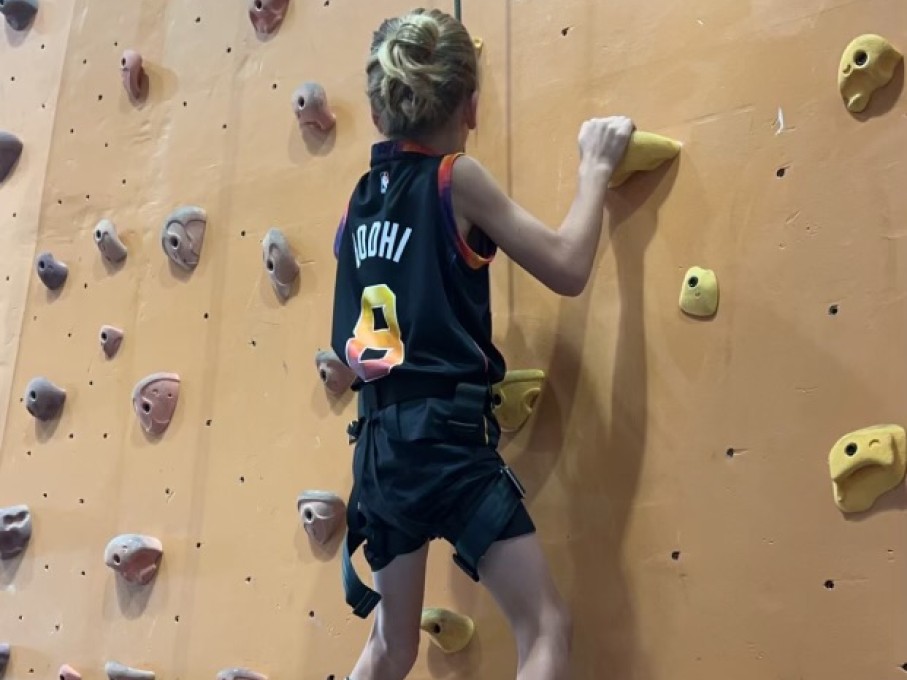A first birthday is a time of joy and celebration, but for Greg and Colleen, it marked the beginning of a journey they never anticipated. In 2018, just before their son, Bodhi, turned one, he experienced his first seizure. Alarmed and worried, Greg and Colleen rushed him to Phoenix Children’s, where they met neurologist Kara Lewis, MD, Medical Director of Fetal Neurology at Barrow Neurological Institute at Phoenix Children's, who performed an electroencephalogram (EEG). An EEG measures electrical activity in the brain and can help diagnose epilepsy.
In 2019, Bodhi suffered another seizure, followed by a particularly severe one while the family was out of town. It became clear that this was not a one-time event, and he began seizure medication. Ultimately, however, Bodhi was diagnosed with medically intractable epilepsy, commonly known as drug-resistant epilepsy, meaning it is not able to be prevented by daily medication. Still, he was able to get a “rescue” medication that helped his parents manage the seizures once they occurred. Anyone caring for Bodhi—whether at school, camp or his grandparents’ home—had his medicine on hand in case he had a seizure.
In the summer of 2019, his doctors at Phoenix Children’s did an MRI, revealing a lesion in his brain, which was determined to be the cause of his seizures. Thankfully, it wasn't malignant, and his physicians believed it was a congenital condition with a possible associated benign tumor.
Initially, Greg and Colleen were told that surgery was an option. Ensuring they were getting the best possible care for their son, they went to California for a second opinion. There, the medical team agreed that while surgery could be an option, it was not the only option for Bodhi. Given the infrequency of his seizures, they believed that the rescue medication could manage his seizures when they occurred. They decided not to opt for brain surgery at that time. Bodhi was showing no developmental delays or issues. His resilient spirit and optimistic attitude meant that his epilepsy diagnosis did not define his life. Once, during basketball season, he had a seizure while watching another game, and ten minutes after his dad gave him the rescue medication, Bodhi went on to play in his own game.
"He had a pretty solid game, too," Greg said with a smile.
Setbacks and New Hope
When the COVID-19 pandemic hit, their routine medical visits were disrupted, but Bodhi continued to have yearly MRIs at Phoenix Children’s to monitor any changes in his brain lesion. Things remained stable for Bodhi during this time. Then, they heard of Angus Wilfong, MD, Division Chief of Neurology and Associate Director of Barrow Neurological Institute at Phoenix Children's, who is a renowned specialist in pediatric epilepsy. The family was eager to meet him, especially as Bodhi's condition seemed to be changing. By early 2024, his seizures had become more frequent, occurring every couple of weeks instead of every couple of months, and the rescue medication was no longer as effective as it once was.
Greg and Colleen also learned that Jason Hauptman, MD, PhD, a highly regarded neurosurgeon, was joining the team at Phoenix Children’s as the Division Chief of Pediatric Neurological Surgery and Associate Director of Barrow Neurological Institute at Phoenix Children's. Knowing that they could get world-class care close to home, they scheduled an appointment with Dr. Wilfong and met Dr. Hauptman. Immediately after meeting Dr. Hauptman they knew they had found the right surgeon for their son.
"Dr. Hauptman is an amazing asset to the Valley," Greg said. "We did get a second opinion at another hospital, but we ultimately came to Phoenix Children’s for Dr. Hauptman."
A Lifechanging Surgery
In July 2024, Bodhi underwent surgery to remove the lesion from his right parietal lobe—the area of the brain that controls sensory processing and some motor functions. The family was prepared for the potential risks, knowing that Bodhi might wake up with limited mobility on the left side of his body. When he did wake up, he couldn’t sit up, walk or use his left arm and hand. Despite these challenges, Bodhi's parents were confident that with therapy he could regain his abilities.
Just days after surgery, Bodhi moved to inpatient rehabilitation, starting physical and occupational therapy almost immediately. The Inpatient Rehabilitation Program at Phoenix Children's is the only pediatric and adolescent acute inpatient rehabilitation program in Arizona, and it is accredited by the Commission on Accreditation of Rehabilitation Facilities (CARF) accreditation.
With the support of the inpatient rehabilitation team, Bodhi began the hard work of relearning to walk and use the left side of his body. After 22 days in the hospital, Bodhi left walking on his own. Since returning home, he has never needed a wheelchair or walker, a testament to his own resilience and determination.
"Bodhi's diagnosis of medically intractable epilepsy that is treatment-resistant is not uncommon,” Dr. Hauptman said. “It's quite common for there to be something on the brain MRI that shows where the seizures are coming from. Some of our best outcomes happen with this kind of epilepsy, where the MRI explains the source, and it's in an area that can be surgically removed. Our goal was a surgical cure."
Dr. Hauptman added that it was crucial that he removed the entire lesion, which turned out to be meningioangiomatosis — an extremely rare, low-grade and slow-growing tumor.
"The good news is that there is no more tumor, which should mean no more epilepsy,” Dr. Hauptman said. "When I first met Bodhi, he was on multiple medications and was experiencing significant side effects from both the medicines and the seizures themselves. Seizures chip away at a child’s attention, personality and neurological function due to the barrage of seizure activity. We knew that removing the lesion could make a significant difference in his quality of life."
Dr. Hauptman added that Bodhi's prognosis is excellent and that it is likely the tumor and seizures will never come back.
“Being seizure-free in the short term is a good indicator that he will remain seizure-free in the long term,” Dr. Hauptman said.
World-Class Care Close to Home
"People need to know we have this amazing surgeon in our backyard," Greg said. "Dr. Hauptman is super approachable and compassionate. We had seen four different neurosurgeons before him, and he was the first one we felt truly comfortable with.”
One of the moments that stood out most to Greg and Colleen was when they were worried about Bodhi’s long blonde hair, which had become an important part of his identity.
"Bodhi is a super chill kid with gorgeous locks," Colleen said. "We were worried that he would have to shave his head before surgery. Before we even asked about it though, Dr. Hauptman said, 'I usually shave boys’ heads, but I can tell this is not one of those cases.' The way he did the incision, you can’t even tell. We really appreciated that what was important to Bodhi was also important to Dr. Hauptman."
"Bodhi’s family was incredibly engaged and well-informed,” Dr. Hauptman added. “His parents saw other physicians and got multiple opinions, which is exactly what I would do as a parent. They were committed to understanding the risks and benefits, and they had a great attitude throughout the process. My role is to support families at these critical decision points, and I try to care for each child as if they were my own. I tell parents all the time—I am here to be on your team and on your child's team."
In addition to the amazing care from Dr. Hauptman and Dr. Wilfong, the family was also impressed with the multidisciplinary and collaborative care they received—every touchpoint felt empathetic and compassionate. They specifically called out Diana Larocque, the epilepsy coordinator, and the neurodiagnostic team, including the EEG techs and MRI techs. Raj Singhal, MD, an anesthesiologist who first met the family at Bodhi's initial MRI and original discovery of the lesion, has administered every anesthetic for Bodhi at Phoenix Children’s. Dr Singhal has been a stabilizing presence throughout the family’s journey. In addition, Greg and Colleen said the inpatient rehabilitation team was a major part of Bodhi's recovery, helping him regain his strength and independence.
Life Beyond Seizures
Today, Bodhi is in school full-time and his love for school shines through every day. Though he is still working on getting his strength and motor function in his left hand back to baseline, his family has seen incredible progress. He has regained his full ability to walk and run, and he loves being active and playing sports. Although he initially had some restrictions, including any activity where he could potentially hit his head, he had a great attitude and chose to focus on low impact sports, such as swimming and golf during that time. Bodhi has since been cleared of all restrictions and is thrilled to be back to recess, physical education, basketball and soccer.
"Bodhi is such a resilient kid," Colleen said. "He’s built a special relationship with Dr. Hauptman and the inpatient rehabilitation team—they all loved Bodhi. We have so many videos and pictures from his inpatient rehabilitation stay that show his incredible progress, including a discharge parade set to one of Bodhi’s favorite songs. It was such a special moment. We had traveled to Amsterdam the week before surgery to see Taylor Swift in concert. It was an emotional trip because of the pre-surgery nerves, but he loved being in a different country and especially loved riding public transit. He always wore friendship bracelets during therapy—it was his way of staying positive."
Greg and Colleen added that if he remains seizure-free, some of the things they have learned to live with will fall away to make room for more opportunities.
"He’ll be able to have sleepovers and go on field trips without us needing to be there,” Colleen said hopefully.
“We never let his condition hold him back; as far as he can remember, he has had seizures and taken daily medications. But Bodhi never thought there was something wrong with him. We treat him like a typical kid and want him to do anything he wants to do—and he knows there’s nothing he can’t do,” Greg said.
Bodhi loves new things, especially sports, chess and math. He also loves playing cards with his grandparents who are a big part of his life.
“They give us peace of mind, knowing he is in good hands,” Colleen said. “We can’t leave him with just anyone, but we know he’s safe with them."
Greg and Colleen expressed their deep gratitude for Phoenix Children’s, noting that the world-class, personalized care their family received made all the difference.
“We truly believe this experience has profoundly improved our son’s life, and we will be forever thankful for the exceptional care provided by every member of the team,” Greg said.
Visit Phoenix Children’s Epilepsy Program to learn more.





